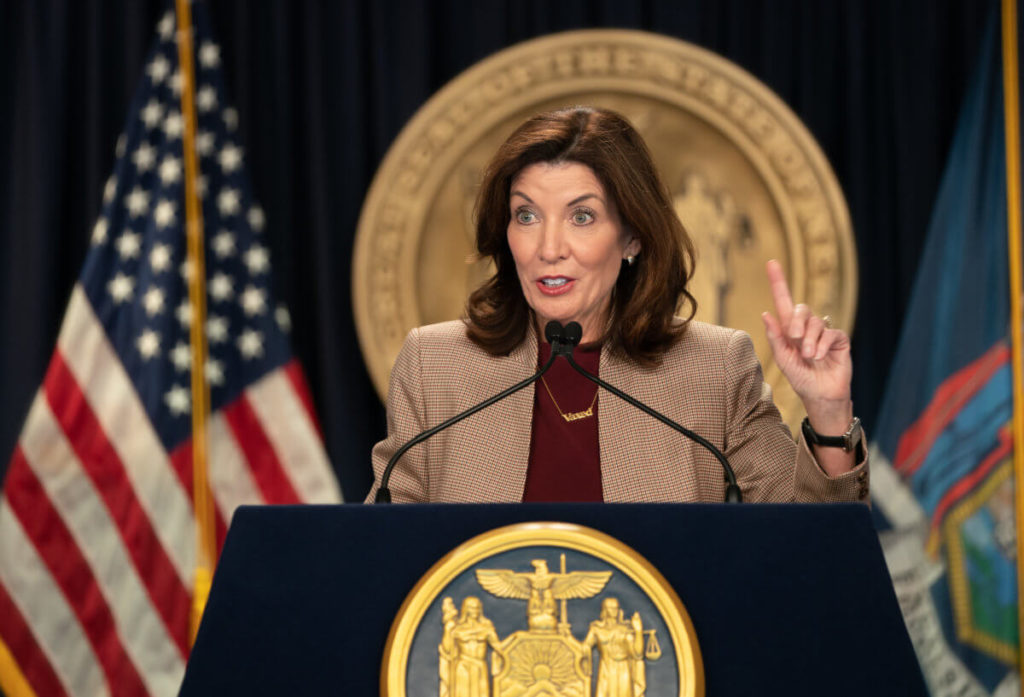[ad_1]
Governor Kathy Hochul wants to do away with the state’s 421-a tax break for residential real estate development in New York City, and replace it with a new program more tailored to creating and maintaining affordable housing, she announced Wednesday in her first State of the State address.
Hochul did not release a specific proposal for a replacement program, but did offer several things she would like to see in one: a focus on fostering deeper and longer-term affordable housing, for one, as well as ensuring that taxpayer dollars are spent more efficiently, while still incentivizing the construction of rental housing across the city.
The proposal is part of a $25 billion plan by Hochul, announced in her address to the State Legislature, to create and preserve 100,000 affordable homes statewide.
“In the wake of the pandemic, it’s crucial that we tackle the housing crisis and make New York a more affordable place for all,” the governor said in a statement. “These bold steps are a major step forward in transforming our housing market, protecting affordability and increasing the housing supply.”
421-a, which reduces property taxes owed on a piece of land when it’s developed for residential use, was created in the 1970s with the aim of incentivizing the development of housing; at the time, the city’s economy was in the gutter and property investors were keeping their distance. Over time, as the financial health of the city improved, the state began requiring that properties receiving the tax break include affordable housing.
The program is set to expire this June. The last time it expired, in 2016, it was allowed to lapse for over a year after disagreements arose between stakeholders on affordability requirements and wages in the construction industry; it was revived in mid-2017 under the moniker “Affordable New York,” and rebranded more explicitly as an affordable housing program.
Proponents of 421-a have said that it is essential to the creation of nigh any housing, let alone affordable housing, in the New York City market, where land and development costs are so high that in its absence, real estate development would not make financial sense. The Real Estate Board of New York (REBNY), a landlord trade group that’s long been one of the tax break’s strongest proponents, says it’s responsible for 30 percent of below-market rental housing stock production since 2014.
Opponents frame it as a massive giveaway to the real estate industry without a meaningful commitment to actual affordability, as well as depriving the city’s coffers of significant tax revenue (in Fiscal Year 2020, it cost the city nearly $1.6 billion in uncollected revenue).
While Hochul will have to push her repeal-and-replace scheme through the State Legislature, she appears to already have a key, unexpected ally in the effort: REBNY. In a statement, REBNY president James Whelan said the group is in support of the governor’s push for a new program which would place added emphasis on ensuring the availability of affordable housing.
“New York City needs far more rental apartments, particularly at lower rents – and it’s clear the private sector must continue to play a key role in producing it,” Whelan said in the statement. “We support Governor Hochul’s sensible proposals for addressing the city’s housing crisis by eliminating density limits so the City can rezone areas with good mass transit, pursuing commercial-to-residential conversions, and creating a new program that incentivizes the development of rental apartments and produces more affordable housing for New Yorkers.”
With REBNY’s support, the measure will likely have an easier time making it through Albany, as the powerful interest group would not be spending time and money lobbying legislators to keep the tax break.
“I was glad to hear the Governor highlight the boondoggle that is the 421-A tax abatement program,” said City Comptroller Brad Lander, a longtime opponent of 421-a. “Reforming our regressive and opaque property tax system, and making better use of our affordable housing dollars are essential.”
Repeal of 421-a is far from the only plank of the governor’s housing platform as outlined in her State of the State address. She also proposed legalizing accessory dwelling units, building denser housing surrounding transit hubs across the state, relinquishing state limits on density in New York City, and reforming zoning rules to allow for easier conversion of hotels into affordable housing. She also wants to prohibit landlords from automatically rejecting applicants with bad credit history or criminal records, provide free counsel to those facing eviction (modeled after New York City’s program), and require all new construction emit zero greenhouse gases by 2027.
Other proposals went unmentioned, such as a push to allow evictions only for “good cause.” The City reported on Tuesday that Hochul is considering allowing the state’s eviction moratorium expires this month.
[ad_2]
Source link
